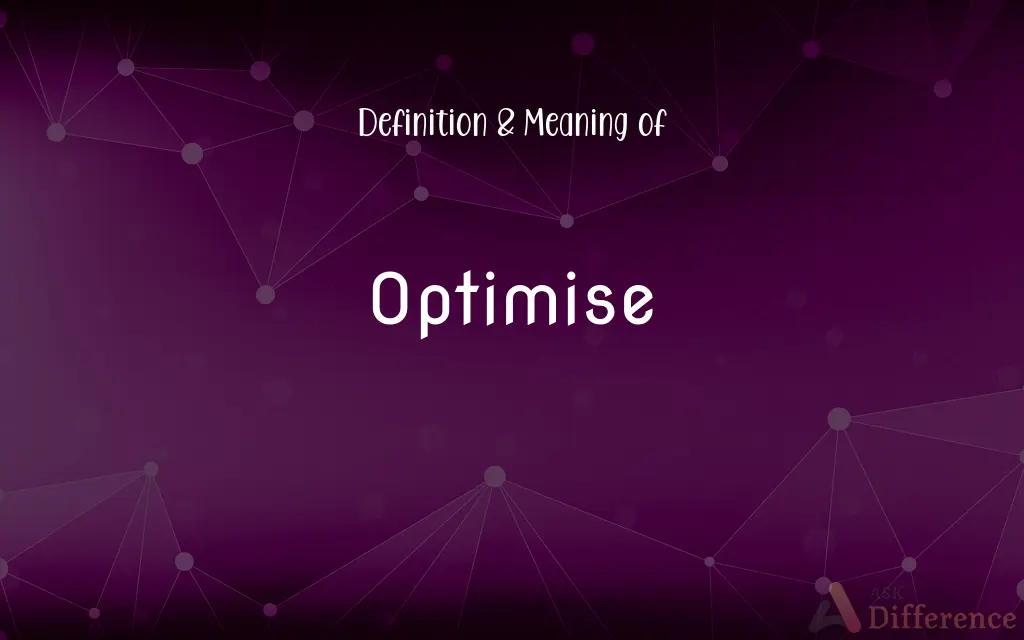Optimise Definition and Meaning
By Fiza Rafique & Urooj Arif — Published on June 23, 2024
Optimise refers to make the best or most effective use of a situation, opportunity, or resource. e.g., The team sought to optimise their resources to complete the project on time.

Table of Contents
Optimise Definitions
To improve a system so that it operates in the most efficient or effective way.
The company optimises its delivery routes to save time and fuel.
To make as perfect, effective, or functional as possible.
They plan to optimise the software for faster performance.
To use something in a way that maximizes its effectiveness or value.
The NGO aims to optimise the use of donations for relief efforts.
To apply techniques or modifications to enhance functionality or efficiency.
Web developers optimise websites for faster loading times.
To carry out the process of finding the best solution or strategy among various choices.
The algorithm optimises the selection of stocks for investment portfolios.
To adjust or modify something to achieve the best outcome or performance.
He optimised his study schedule to prepare for exams.
To fine-tune settings or configurations for optimal performance.
Optimising your computer's settings can significantly improve its speed.
To maximise the effectiveness of an action or strategy.
The marketing team optimised their campaign to reach a broader audience.
To enhance a process or system to achieve the best possible result under given constraints.
Engineers are working to optimise the energy consumption of household appliances.
To increase the efficiency of a process by making the best use of available resources.
Farmers optimise water usage through drip irrigation systems.
Standard spelling of optimize
Same as optimize.
Make optimal; get the most out of; use best;
Optimize your resources
Modify to achieve maximum efficiency in storage capacity or time or cost;
Optimize a computer program
Act as an optimist and take a sunny view of the world
Optimise Snonyms
Improve
To make or become better.
He took classes to improve his public speaking skills.
Enhance
To improve the quality, value, or extent of something.
She enhanced the photo's brightness for more clarity.
Perfect
To make something as good as it can be.
The artist spent weeks perfecting the painting.
Streamline
To make an organization or system more efficient and effective by employing faster or simpler working methods.
The new software streamlined the data entry process.
Refine
To make small changes to improve something.
The chef refined the recipe to achieve the perfect flavor balance.
Maximize
To increase something as much as possible.
She aims to maximize her savings by cutting unnecessary expenses.
Upgrade
To raise something to a higher standard, in particular, improve equipment or machinery by adding or replacing components.
Upgrading the software can significantly enhance your computer's performance.
Amend
To make minor changes to (a text, document, etc.) in order to make it fairer, more accurate, or more up-to-date.
The policy was amended to reflect the new regulations.
Fine-tune
To make very small adjustments to something in order to achieve the best performance.
Engineers fine-tuned the engine for optimal efficiency.
Elevate
To raise to a more important or impressive level.
The director's vision elevated the film beyond a typical action movie.
Optimise Example Sentences
To optimise energy use, the company installed solar panels.
They're working to optimise the website for mobile users.
Common Curiosities
How do we divide "optimise" into syllables?
"Optimise" is divided into syllables as op-ti-mise.
How many syllables are in "optimise"?
There are three syllables in "optimise."
Why is it called "optimise"?
"Optimise" (or "optimize" in American English) derives from the Latin "optimus," meaning "best," reflecting the process of making something as effective or functional as possible.
What is the pronunciation of "optimise"?
The pronunciation of "optimise" is /ˈɒptɪmaɪz/ in British English and /ˈɑːptɪmaɪz/ in American English.
What is the second form of "optimise"?
The second form of "optimise" is "optimised," which is the simple past tense.
What is the third form of "optimise"?
The third form of "optimise" is "optimised," used as the past participle in perfect tenses.
What is the singular form of "optimise"?
As a verb, "optimise" does not have a singular or plural form in the traditional sense; its use is consistent regardless of number.
What is a stressed syllable in "optimise"?
The stressed syllable in "optimise" is the first syllable, "op."
How is "optimise" used in a sentence?
"Optimise" is used to describe the action of making the best or most effective use of something. e.g., The software was optimised for quicker data processing.
What is the verb form of "optimise"?
The verb form of "optimise" is "optimise," referring to the process of making something as efficient or effective as possible.
What part of speech is "optimise"?
"Optimise" is a verb.
What is another term for "optimise"?
Another term for "optimise" is "enhance" or "improve."
What is the plural form of "optimise"?
"Optimise," being a verb, does not have a plural form. Verbs change form based on tense rather than number.
What is the root word of "optimise"?
The root word of "optimise" is "optimum," meaning the best or most favorable condition.
What is the first form of "optimise"?
The first form of "optimise" is "optimise," which is used in the present tense.
What is the opposite of "optimise"?
The opposite of "optimise" might be considered "worsen" or "degrade," meaning to make less efficient or to reduce in quality.
Is "optimise" a noun or adjective?
"Optimise" is a verb.
Is "optimise" an adverb?
No, "optimise" is not an adverb; it is a verb.
Is "optimise" a negative or positive word?
"Optimise" generally has a positive connotation, as it implies improvement or making the best of something.
Is "optimise" a vowel or consonant?
The first letter of "optimise," "o," is a vowel.
Is "optimise" a countable noun?
No, "optimise" is a verb and does not have a countable or uncountable noun form.
Is the word "optimise" Gerund?
The gerund form of "optimise" is "optimising," which acts as a noun, e.g., "Optimising the system is crucial."
Is "optimise" a collective noun?
No, "optimise" is a verb and not a noun, so it cannot be a collective noun.
Which vowel is used before "optimise"?
Vowels are not used before verbs in the same way they are with nouns; the use of "optimise" does not depend on preceding vowels.
Which preposition is used with "optimise"?
Prepositions used with "optimise" can vary depending on context, such as "for" (optimised for speed) and "to" (optimise to reduce costs).
Which article is used with "optimise"?
Articles are not directly used with verbs like "optimise."
Is "optimise" an abstract noun?
No, "optimise" is a verb, not a noun, and therefore cannot be classified as abstract or concrete.
Is the "optimise" term a metaphor?
While "optimise" can be used metaphorically to describe improvement or enhancement in various contexts, it is primarily a literal term.
Is the word "optimise" imperative?
Yes, "optimise" can be used in the imperative mood as a command or instruction, e.g., "Optimise the process for better results."
Is the word “optimise” a Direct object or an Indirect object?
As a verb, "optimise" itself cannot be a direct or indirect object, but it can take both in sentences, e.g., "He optimised (verb) the system (direct object) for the team (indirect object)."
Which determiner is used with "optimise"?
Determiners are not typically used with verbs like "optimise."
Which conjunction is used with "optimise"?
The choice of conjunction with "optimise" depends on sentence structure, such as "and" (optimise and improve) or "but" (optimise but maintain quality).
Share Your Discovery

Previous Term
Ease Definition and Meaning
Next Term
Condemnatory Definition and MeaningAuthor Spotlight
Written by
Fiza RafiqueFiza Rafique is a skilled content writer at AskDifference.com, where she meticulously refines and enhances written pieces. Drawing from her vast editorial expertise, Fiza ensures clarity, accuracy, and precision in every article. Passionate about language, she continually seeks to elevate the quality of content for readers worldwide.
Co-written by
Urooj ArifUrooj is a skilled content writer at Ask Difference, known for her exceptional ability to simplify complex topics into engaging and informative content. With a passion for research and a flair for clear, concise writing, she consistently delivers articles that resonate with our diverse audience.



































